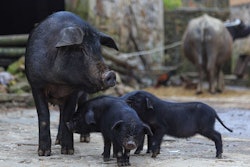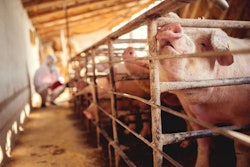
While outbreaks continue sporadically in small herds of domestic pigs in Romania, new cases have been registered among the wild boar populations there as well as in Germany, Hungary and Latvia.
In Russia, African swine fever (ASF) has been detected in Samara oblast for the first time since December 2020, according to the latest report to the World Organisation for Animal Health (OIE). The disease was discovered in a backyard herd of six pigs on April 21.
In February, the disease was detected in wild boar in the same oblast, which is in the Volga federal district of Russia.
Within a few days, ASF hit a farm with around 15,000 pigs in Tambov oblast, the Russian veterinary authority reports. More than 30 of the animals died at the premises in Nikiforovsky district of the oblast, which is in the Central federal district. ASF was last reported in Tambov oblast in February, when it was detected at a farm in the Bondarsky district with around 14,000 pigs.
Also located in the Central federal district, Yaroslavl oblast is the location of the third of Russia’s latest ASF outbreaks. Here, the virus was detected in the only pig at the premises in the Yaroslavl district during the first week of May. The most recent previous outbreak in this oblast was at a farm with around 320 pigs in mid-March
Since the first cases of ASF were detected in western Russia in February 2019, the great majority of outbreaks have occurred in small non-commercial herds. However, during the first weeks of 2021, eight outbreaks were reported by the authorities on large farms, involving more than 92,000 pigs.
General ASF situation in European swine and wild boar
As of May 8, the European Commission (EC) Animal Disease Information System had been informed by European states about a total of 463 ASF outbreaks in domestic pigs so far this year. This is an increase of 61 from the previous update (to April 18). Of this total, 59 were in Romania, bringing the country’s total to 424 outbreaks so far this year. Serbia has now recorded 33 outbreaks. Making up the total are five outbreaks in Ukraine, and one in Poland.
Over the past two weeks, Romania’s veterinary authority has registered 15 new ASF outbreaks in domestic swine. According to official reports to the OIE, these outbreaks were all in backyard herds, and involved a total of almost 300 animals.
Latest update from the EC animal disease system puts the total for outbreaks of ASF among European wild boar so far this year at 6,105 (as of May 8).
Compared with the previous update to April 18, this is an increase of 1,056. During the whole of 2020, total cases of ASF in Europe’s wild boar recorded through this system reached 11,027.
In Europe, Hungary has been worst affected, recording 2,029 outbreaks for the year in 2021 — an increase of 355 from the previous EC report. Next comes Poland with 1,415 outbreaks, followed by Slovakia (949), Romania (662), Germany (647) and Bulgaria (157). Ukraine has registered its first cases of the year through the EC. Cases have also been confirmed in five other European states this year — Estonia, Italy, Latvia, Lithuania and Serbia — but their national totals stand at less than 100.
The EC system does not cover Russia.
New cases registered in wild boar in five European countries
Since the beginning of May, 12 individual and two clusters of ASF outbreaks have been reported in Hungary. According to the official OIE report, these occurred between April 2 and May 1, and involved a total of 327 animals.
Also confirming with the OIE new outbreaks among the wild population over this period were Romania (33 outbreaks), Germany (13), Latvia (five) and Russia (two). The Russian outbreaks occurred in the oblasts of Tver and Kaluga, which are both located in the Central federal district.
With 983 confirmed cases since September 2020 (as of May 12), the eastern German state of Brandenburg continues to bear the brunt of the nation’s ASF infections. Positive cases have been detected in five districts, according to the state agriculture ministry. Of the total, 566 cases have been found in Oder-Spree, making this the worst-affected district for ASF-infected wild boar in Germany.
Neighboring Saxony is the only other state where ASF-positive cases have been detected among wild boar. By May 17, this total had reached 186. This is an increase of 34 since May 4, reports the agriculture ministry of this state. All infected cases so far have been found in the district of Görlitz. Germany’s domestic pigs have so far remained free of ASF.
From Poland, the chief veterinary office has not issued an update on the ASF situation among the country’s wild boar. Latest total was 1,225 outbreaks for the year so far (as of April 29).
While continuing to send regular updates to the OIE, Moldova’s animal health agency reports no new ASF outbreaks. The most recent cases were in a backyard herd in September 2020. This and all cases in wild boar — totaling 178 animals — were in western counties that border Romania. ASF was first detected in Moldova in December 2019.
View our continuing coverage of the global African swine fever situation.
















